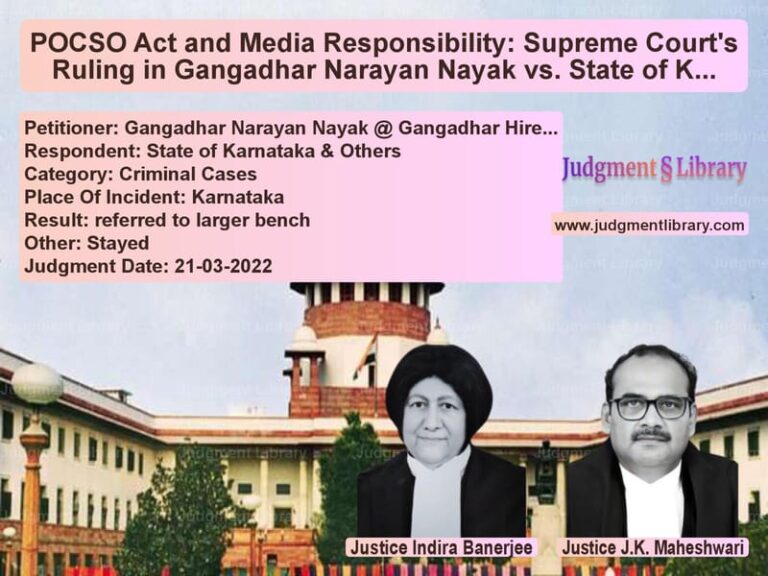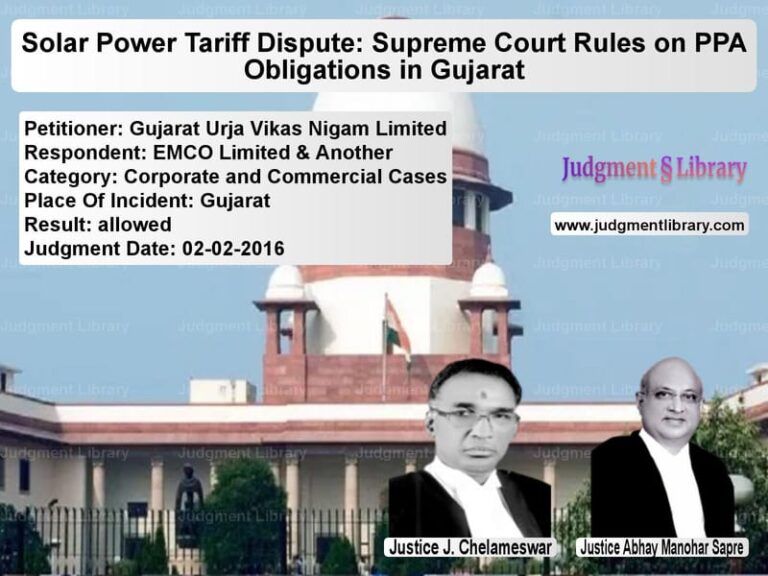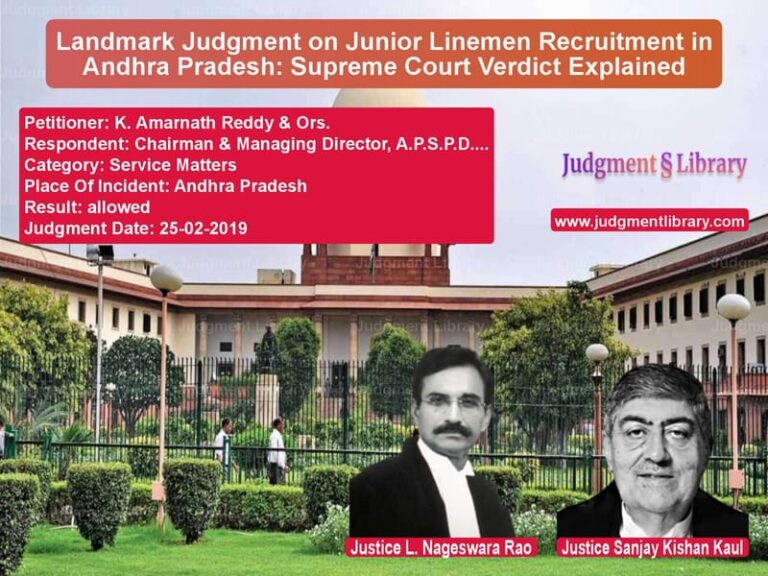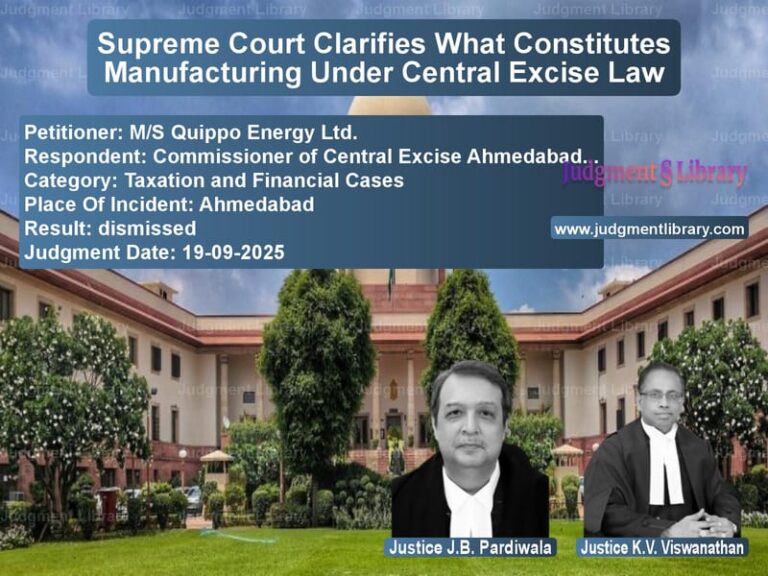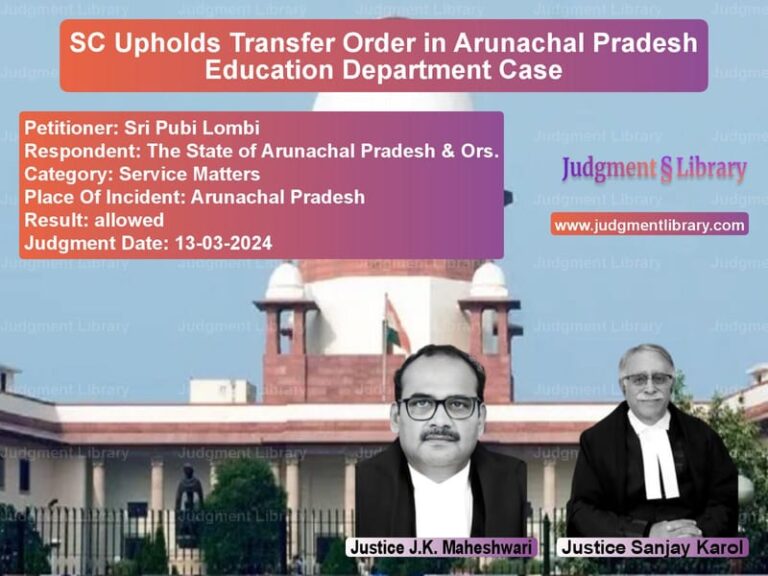Land Acquisition and Compensation: Supreme Court Clarifies Lapse Conditions
The case of Government of NCT of Delhi & Anr. v. Khajan Singh & Anr. is a crucial judgment dealing with land acquisition and compensation under the Right to Fair Compensation and Transparency in Land Acquisition, Rehabilitation and Resettlement Act, 2013 (“2013 Act”). The Supreme Court clarified when an acquisition process lapses under Section 24(2) of the 2013 Act and addressed inconsistencies arising from earlier rulings.
Background of the Case
The dispute originated from a decision of the Delhi High Court, which held that land acquisition proceedings under the Land Acquisition Act, 1894 (“1894 Act”) had lapsed because the compensation was not tendered to the landowners. The High Court relied on the Supreme Court’s earlier judgment in Pune Municipal Corporation & Anr. v. Harakchand Misirimal Solanki & Ors. (2014) 3 SCC 183, which stated that failure to pay compensation resulted in the lapse of acquisition.
The Government of NCT of Delhi challenged this decision, arguing that the Supreme Court’s Constitution Bench in Indore Development Authority v. Manoharlal & Ors. (2020) 8 SCC 129 had overruled the Pune Municipal Corporation case. The Supreme Court had to determine whether the High Court’s ruling was consistent with the Constitution Bench decision.
Legal Issues Considered
The Supreme Court addressed the following key legal issues:
- Whether land acquisition proceedings lapse if compensation is not paid but possession has been taken.
- Whether the High Court erred in applying the Pune Municipal Corporation ruling despite its subsequent overruling.
- Whether the twin conditions under Section 24(2) of the 2013 Act were satisfied for lapsing.
Arguments by the Appellants (Government of NCT of Delhi)
The appellants, the Government of NCT of Delhi, contended that:
- The High Court’s decision was based on an overruled precedent (Pune Municipal Corporation case).
- As per the Constitution Bench ruling in Indore Development Authority, for acquisition to lapse under Section 24(2), both possession must not have been taken and compensation must not have been paid.
- In this case, possession of the land had been taken on specific dates, as recorded in official returns and affidavits.
- Since possession had been taken, the acquisition did not lapse merely because compensation had not been paid.
Arguments by the Respondents (Khajan Singh & Anr.)
The respondents, who were the original landowners, argued that:
- They had been dispossessed of their land without receiving any compensation.
- The High Court correctly relied on Pune Municipal Corporation, which held that non-payment of compensation led to lapse of acquisition.
- The government failed in its duty to compensate the landowners, violating their rights.
Supreme Court’s Judgment
The Supreme Court ruled as follows:
- The High Court’s reliance on Pune Municipal Corporation was incorrect: The Constitution Bench in Indore Development Authority had explicitly overruled this case.
- Acquisition does not lapse if possession has been taken: The Court reaffirmed that under Section 24(2) of the 2013 Act, both conditions (non-possession and non-compensation) must be met for lapse to occur.
- Since possession was taken, acquisition remains valid: The Court found that government records confirmed possession had been taken, so the acquisition did not lapse despite non-payment of compensation.
- The High Court’s decision was unsustainable: The judgment was set aside, and the acquisition remained valid.
Analysis of the Judgment
The ruling clarifies the interpretation of Section 24(2) of the 2013 Act and reaffirms the Constitution Bench’s position in Indore Development Authority. It settles confusion caused by conflicting precedents and prevents landowners from exploiting legal loopholes to challenge concluded acquisitions.
Implications for Landowners
- Landowners cannot claim lapse of acquisition solely on the ground of non-payment of compensation.
- If possession has been taken, the acquisition remains valid under the law.
Implications for the Government
- Governments must ensure that compensation is paid promptly to avoid disputes.
- The ruling strengthens the state’s position in defending completed acquisitions.
Implications for Future Land Acquisition Cases
- The ruling provides a definitive interpretation of Section 24(2) of the 2013 Act.
- It prevents unnecessary litigation by clarifying that lapse occurs only when both possession and compensation conditions are unmet.
Conclusion
The Supreme Court’s judgment provides much-needed clarity on land acquisition laws. By upholding the validity of acquisitions where possession has been taken, it ensures that infrastructure projects and public development initiatives are not unduly hampered by legal ambiguities. This ruling serves as a crucial precedent for similar cases in the future.
Petitioner Name: Government of NCT of Delhi & Anr..Respondent Name: Khajan Singh & Anr..Judgment By: Justice M.R. Shah, Justice C.T. Ravikumar.Place Of Incident: Delhi.Judgment Date: 20-01-2023.
Don’t miss out on the full details! Download the complete judgment in PDF format below and gain valuable insights instantly!
Download Judgment: government-of-nct-of-vs-khajan-singh-&-anr.-supreme-court-of-india-judgment-dated-20-01-2023.pdf
Directly Download Judgment: Directly download this Judgment
See all petitions in Property Disputes
See all petitions in Public Interest Litigation
See all petitions in Judgment by Mukeshkumar Rasikbhai Shah
See all petitions in Judgment by C.T. Ravikumar
See all petitions in allowed
See all petitions in Quashed
See all petitions in supreme court of India judgments January 2023
See all petitions in 2023 judgments
See all posts in Civil Cases Category
See all allowed petitions in Civil Cases Category
See all Dismissed petitions in Civil Cases Category
See all partially allowed petitions in Civil Cases Category


